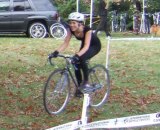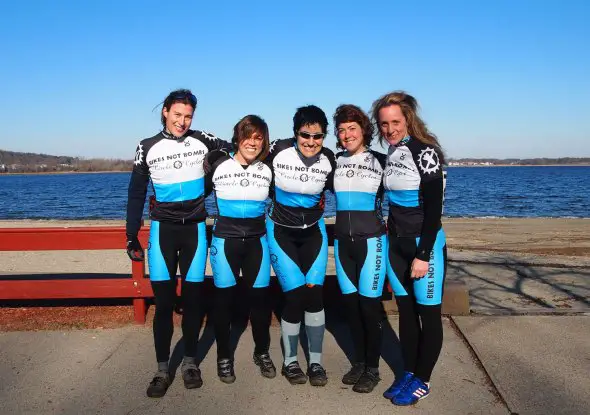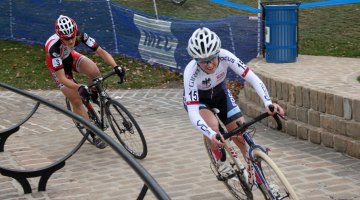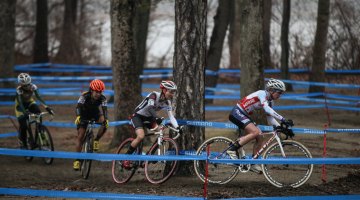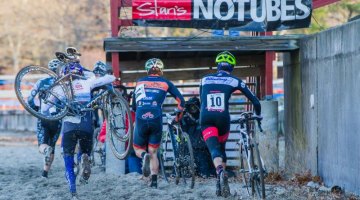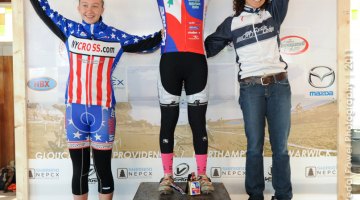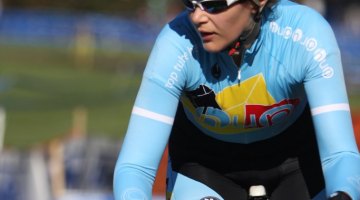Cindy Brennan is a librarian by day, as well as a part-time student and she’s wrapping up her second season of cyclocross. She races for Bikes Not Bombs, which promotes bicycle technology as a concrete alternative to war and environmental destruction. For 25 years, BNB has been a nexus of bike recycling and community empowerment both in lower income neighborhoods of Boston and in the nations of the Global South. BNB’s programs involve young people and adults in mutually respectful leadership development and environmental stewardship, while recycling thousands of bicycles.
I learned what cyclocross is three years ago, when I came to watch my friend Dan Langlois race, sporting a scarf while sprinting through the snow-covered beach at NBX. Despite having no real athletic experience, and having essentially learned to ride a bike only the year before, what I thought as I gazed on this scene of suffering was: I should try this.
The following summer, elite racer David Wilcox spent an afternoon with me teaching me how to dismount and remount, and that autumn I tried my first race at Canton, on the very same touring bike I had just ridden around Japan for two weeks. Britlee Bowman, now a blazingly fast elite racer, but then among the ranks of the 3/4 women, approached me at the start line excitedly asking if this was my first race, and was I really racing flat pedals and wearing a black dress? (Yes, and yes, with a rhinestone necklace.)
She told me about her first races with such zeal that I almost forgot how nauseous I was. The enthusiasm and support shown by cyclocrossers when I was first starting out made all the difference, and I was soon hooked.
Bike racing is hard. Cyclocross, forty-five minutes or more of all-out blinding effort, requiring equal parts adept bike handling and straight-up power, is really hard. Now in my second season, I’ve improved greatly but am still facing a painfully and frustratingly steep learning curve, battling my cycling ineptitude, nascent fitness, and mechanical failures on cyclocross courses carving through New England’s harsh and challenging terrain weekend after weekend.
This has been a season full of firsts, tiny triumphs, and staggering disasters: a dropped chain at the start at Green Mountain left me 30 seconds off the back of the race, but I learned how to turn myself inside out to catch back on; my shoe came apart while running through my first-ever muddy race at Nor-Easter; I rode through a sand pit for the first time in Northampton; my first hole shot at Plymouth ended with a crash in the sand – rendering my bike a single speed.
So, why would I spend my weekends doing this? Why do I wake up before the sun’s up to train, struggling through challenging intervals with the hopes it’ll pay off with improvement? As it was when I started racing, the people at cyclocross races are what keeps me coming back – especially the ladies of the 3/4 field.
It’s true that they are a group of extremely friendly ladies with whom I enjoy going out for drink as much as tearing up a cyclocross course, but don’t get me wrong. It’s not all kittens and glitter (well, not all the time, anyway). These are the toughest people in my life, women who conquer the physical feats and mental challenges of cyclocross racing without batting an eyelash. They encourage me to get tougher, get radder, shred harder. By example, they’ve taught me to steel myself against the roughest of courses and the worst of my cyclocross disasters, how to dig myself out from a start-line pile-up, get up, and race.
In Warwick, three years after I first laid eyes on cyclocross, I was joined at the race by teammates from the new Bikes Not Bombs/Circle A Cycles cyclocross team. Among our squad were six 3/4 women all in our first or second season of racing, all graduates of a women’s cyclocross skills clinic the team organized with elite racer Adam Myerson of Cycle-Smart. Adam donated his time to teach a total of twelve beginner women cyclocross-specific skills such as mounts, dismounts, and barrier techniques in an urban park in Dorchester, Massachusetts. Proceeds from the clinic benefited the team and Boston-based organization Bikes Not Bombs. In the weeks before NBX, the more experienced among us gave our teammates who were brand-new to racing cyclocross some tips and advice about what to expect.
This is the community I found when I first started racing, and this is the community we’ll continue to build. We’ll help each other out, teaching new racers the skills required to race cyclocross, share which line we plan to take during pre-ride laps – but mostly, we’ll show each other how to line up, clip in, and tear it up.













